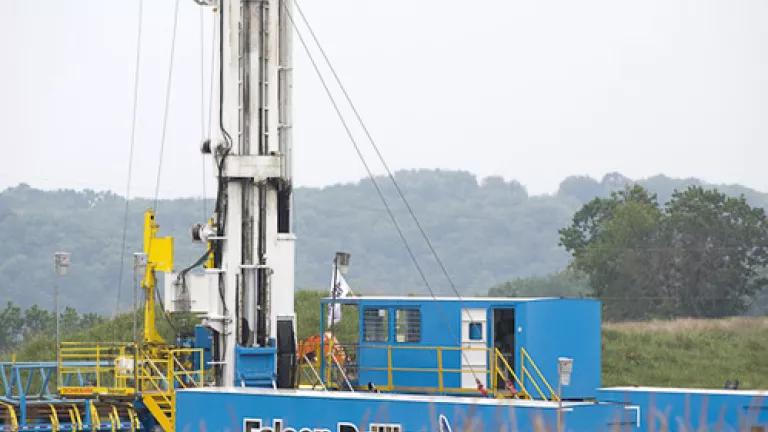
Yesterday I returned from several days in western Pennsylvania seeing and hearing about the impacts of fracking first hand from local activists, homeowners, and scientists. People in the region fear their water is contaminated with toxic substances from fracking operations. They worry the air pollution coming from compressor stations or well pads is harming their families. And they believe their property values are forever compromised.
Their fears were heightened by reports—featured on NPR this week—that the Pennsylvania Department of Environmental Protection has confirmed methane from improperly constructed gas wells has contaminated people’s drinking water in Northern Pennsylvania—and created a risk of fire or explosion in people’s homes and water wells.
We experienced two instances of flammable water, one in a field, another in a jug of drinking water. We don’t know what caused them, and sadly the state doesn’t seem to have investigated to determine the causes, but we could see how disturbing it was for homeowners to have flaming water. Every single person we spoke with had stories of contaminated water and air.
Photo credit: Melanie Blanding
There were many aspects to the trip that were very troubling. First, was the high potential for exposure to contaminants with little to no information on what compounds people may be exposed to. Second was the consistent story of how little response and assistance people were getting from state or local governments.
That is why NRDC is focused on protecting communities from the hazards of fracking. We oppose expanded fracking until effective safeguards are in place. The health and environmental threats posed by fracking are simply too high to let the oil and gas industry run amok in our towns and cities.
In the past five years alone, ExxonMobil, Shell, and other energy companies have drilled more than 200,000 new wells across the United States—many in the backyards of people’s homes, schools, and parks.
These operations can turn rural towns and peaceful suburbs into industrial zones. Gas production and diesel engines emit hazardous levels of air pollution. Millions of gallons of wastewater laced with carcinogens are dumped in open-air reservoirs that can leak and contaminate drinking water. Some people living nearby say they suffer from migraines, dizziness, nausea, asthma, burning eyes, and fainting.
When something goes wrong at one of these well pads, nearby residents have very little recourse. Thanks to the so-called Halliburton Loophole, fracking operations are exempt from the Safe Drinking Water Act and other bedrock environmental measures.
State governments, meanwhile, have a patchwork of often ineffective rules. Only half the states where fracking occurs have even taken the simple step of requiring companies to disclose the chemicals they use in fracking fluid. And in eight of those states, companies can withhold any information they decide is confidential. And state enforcement of existing rules is woefully inadequate.
NRDC is committed to changing this. We are pushing for strong national safeguards for fracking, and helping empower local communities to restrict or ban dangerous fracking as they so choose. We want to ensure that reckless fracking operations no longer endanger people’s health and well being.
